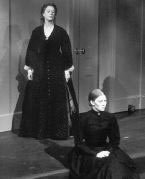MOURNING BECOMES ELECTRA
ACT Theatre, 700 Union, 292-7676, $10-$44 7:30 p.m. Sun.-Thurs.; 8 p.m. Fri.-Sat.; 2 p.m. select matinees ends Sun., May 19
STAGING A THREE-HOUR classic is one thing; making an old play fervent and feisty is another. ACT’s production of Mourning Becomes Electra, Eugene O’Neill’s update of Aeschylus’ Oresteia, lets you have your poisonous cake and eat it, too.
Lavinia (Mireille Enos), a stiff young woman seemingly frozen to emotion, awaits the post-Civil War return of Oedipally complexed brother Orin (Steven Sutcliffe) and the father with whom she is obsessed, Brig. Gen. Ezra Mannon (Michael MacRae), both soon to be back in the arms of Christine (Jane Alexander), the mother and wife incapable of loving any of them enough. Christine is conducting an illicit affair with Adam Brant (a dignified Thomas Schall), a lowly sea captain and the reviled bastard son of the Mannons’ disgraced former servant; their passion, the one glimmer of truth in Mrs. Mannon’s fraudulent world, gives Christine fodder for foul play.
Nudge any of this at all and you’ve got the makings of unintentional hilarity, what with the incestuous longings, heightened proclamations of love and vengeance, and a body count so riotously relentless that when a character announces he’s off to clean his pistol, you can’t help but hoot (did people really sit straight-faced through all this back at its 1931 Broadway premiere?).
O’Neill’s concerns, however, are too informed by intellect for high camp, and ACT’s exiting artistic director Gordon Edelstein hasn’t gone google-eyed over them. What at first seems like a too-measured attempt to underplay the frenzy (is it cheap to want just a little more frothing at the mouth?) reveals itself as forethought. Edelstein has found the troubled gray areas in what could easily—and entertainingly—be played as black-and-white melodrama, vividly tapping into O’Neill’s larger-than-life disgust with death, destruction, and the conscious, careless brutality that tears the world apart. The production is an expert exercise in controlled hysteria; at the end of Act I, Lavinia is straddling the body of her murdered father, mounting him in her black dress like a sexual shroud, and by play’s end she and everyone else are spitting nails. It’s juicy fun, to be sure, but grounded in mortal dimensions.
Alexander’s wounded, cunning performance makes Christine’s manipulations seem less like malevolence and more like desperate human panic, a tragically wrongheaded grasping after personal happiness (or what O’Neill lyrically calls “dirty dreams of love”). When Christine’s hopes are finally dashed, Alexander circles Enos, moaning like a sickened and enraged lioness, and your heart goes out to her. It’s a spectacular moment, made more resonant by Enos’ seething transformation from vengeful ice queen to similarly defeated lost soul. Their Mourning provides the joy of compelling theater.








